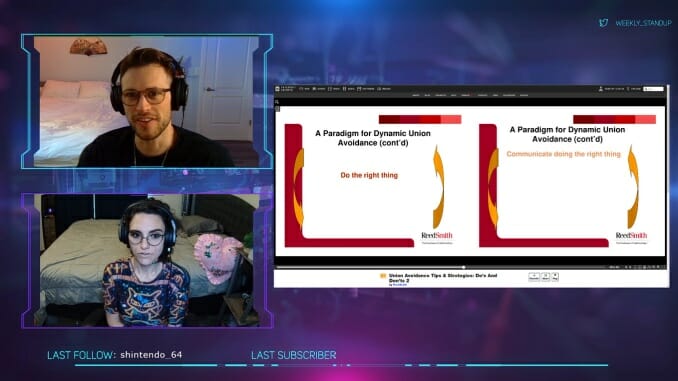With New Series Weekly Standup, Former Activision Blizzard Employees Are Raising Their Voices On Workers’ Rights, Unionization
Screenshot via Twitch, Image via Weekly Standup
Activision Blizzard became the dominating image of worker mistreatment, harassment and abuse within videogame development when the California Department of Fair Employment and Housing sued the company last July. The severity and amount of allegations compiled in the agency’s complaint shook the wider public into paying attention to the company’s practices in a similar fashion to how the handling of former Hearthstone pro Blitzchung’s support of protests in Hong Kong and the company firing 800-plus employees after posting record revenues in 2019 riled up those within games circles.
The months since the lawsuit’s filing have seen virtual and in-person protests, Microsoft’s proposed purchase of Activision Blizzard and additional lawsuits, including a wrongful death suit being filed by the family of Activision Blizzard finance manager Kerri Moynihan on Thursday. But that same period also saw worker protections and unionization become a focus for current and former Activision Blizzard employees.
Two of those former employees, video editor Josh Miller and ABetterABK founder Jessica Gonzalez, are now bringing that conversation directly to the public with their new Twitch channel, Weekly Standup. Gonzalez and Miller sat down with Paste to discuss the show, where it fits into the greater conversation of unionization within tech and their experiences working for Activision Blizzard.
How did Weekly Standup come to be?
Jessica Gonzalez: Josh actually approached me via email and was like, “Hey, I’ve been wanting to cover this topic for a long time. Do you want to start something together?” And we started Weekly Standup. Our goal is to talk about workers’ rights in the games industry with goals of unionization and just have conversations with devs and tell people their rights. A lot of people are scared with NDAs and forced arbitration, and we’re trying to put these issues to light and keep it at the forefront.
Josh Miller: I was working at Activision Blizzard on the editing and post production side working on their Esports leagues. I was just getting really upset with the management’s behavior towards myself, my team and my co-workers.
After some layoffs and seeing what was going on throughout the wider company, as well as certain factors industry-wide like what was going on at Riot, what happened at Ubisoft, my anger just kept building to the point where I wanted an outlet for that. I wanted someone to speak on behalf of the devs and my friends and I didn’t see that out there at the time. I kept talking with my friends about it for the next year until I just got tired of it and I reached out to Jess.
Obviously game development isn’t a one-to-one comparison to other arms of tech, but we are seeing workers at large tech companies organizing unionization efforts or attempting to get them off the ground. Do you see any similarities between your efforts and those of workers at Amazon, Tesla, etc.?
JG: I mean, exploitation is just a thing that happens, especially in the United States. People are going to exploit labor. They want labor for nothing and they want shit done fast, and they don’t care. I feel like we’re starting to really see that manifesting in the way workers are treated, and it’s not just our industry, it’s every industry. I think workers are savvy to it at this point. You’re seeing so many open positions.
Right now, Blizzard has the most open positions they’ve had in so long. It’s so hard to fill roles because they don’t want to pay what people are worth, and all these executives like Jeff Bezos, like Elon Musk, are making billions of dollars. A $200 million bonus payout for Bobby Kotick last year while laying off hundreds of people just doesn’t make sense, right? So a lot of people are realizing that their labor is exploited. And I feel like that can translate to any industry.
JM: If you look on the macro, it’s been kind of a worldwide movement for the last couple of years. As far back as when Bernie [Sanders] was competing for the presidency. The fact that he’s gained so much grassroots support, I think signals that this is a thing happening nationwide right now. And more and more people are starting to not trust the old way of doing things, like trickle down economics, being happy with what you get, pulling yourself up by your bootstraps. I think that people are just becoming more educated in general, and realizing none of those things are really true. I’m hopeful that, if trends continue, we’re gonna see more and more support for this, and maybe change will actually start to happen.
-

-

-

-

-

-

-

-

-

-

-

-

-

-

-

-

-

-

-

-

-

-

-

-

-

-

-

-

-

-

-

-

-

-

-

-

-

-

-

-








































